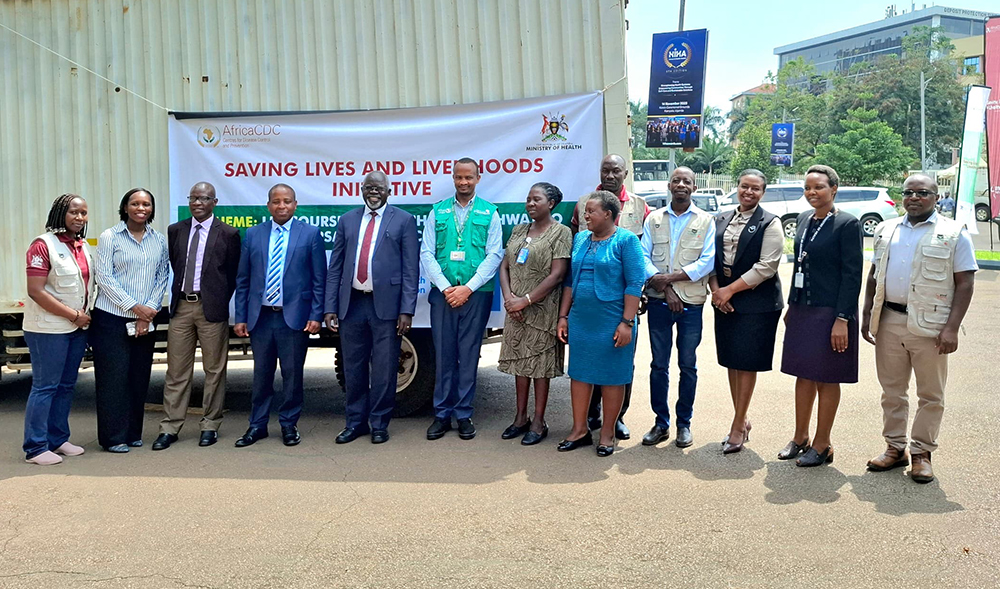Immunisation guideline countrywide distribution kicks off
“These tools are a broader investment in capacity building and in the sustainability of Uganda’s immunisation programme, reaffirming Africa CDC’s dedication to strengthening regional manufacturing, disease surveillance and the new public health order,” Molla said.
Representing the Director General of Health Services, commissioner for health Services at the health ministry Dr Alfred Driwale, praised the partnership between Amref, Africa CDC, and the ministry, noting its long history and impactful contributions, including during the COVID-19 vaccination campaign.
KAMPALA - The health ministry, together with partners Africa CDC, Amref Health Africa, and UNICEF, has officially launched and flagged off the nationwide distribution of Routine Immunisation Job Aids (a collection of useful quick guides), a major milestone in strengthening Uganda’s immunisation service delivery.
The job aids were developed under the Saving Lives and Livelihoods project, funded by the Mastercard Foundation.
The ceremony at the health ministry's headquarters in Kampala city on November 11, 2025, brought together senior government officials, development partners, district leaders, and health experts, all united by a shared vision: Ensuring equitable access to life-saving vaccines for every child, woman, and man across Uganda.
Speaking at the event, the representative of Africa CDC, Gebremichael Molla, emphasised that the handover signified a renewed commitment to protecting communities and supporting frontline health workers.
He noted that immunisation remains one of the most cost-effective public health interventions, yet its success depends heavily on the quality and consistency of its delivery.
The new job aids are designed to equip health workers described as “our frontline heroes” with practical guidance to improve service quality, efficiency and accuracy.
“These tools are a broader investment in capacity building and in the sustainability of Uganda’s immunisation programme, reaffirming Africa CDC’s dedication to strengthening regional manufacturing, disease surveillance and the new public health order,” Molla said.
Delivering remarks on behalf of UNICEF, Zero Dose consultant Milly Namalwa Kigongo lauded the long-standing collaboration between UNICEF, AMREF Health Africa, Africa CDC, and the health ministry.
She underscored that the launch should mark only the beginning of a comprehensive rollout that ensures the job aids are used in every facility and community.
“We must ensure that behind every child, every girl, woman, and man, this tool is active and helping us leave no one behind,” she said.
Impactful contributions
Representing the Director General of Health Services, commissioner for health Services at the health ministry Dr Alfred Driwale, praised the partnership between Amref, Africa CDC, and the ministry, noting its long history and impactful contributions, including during the COVID-19 vaccination campaign.
He highlighted Uganda’s shifting disease burden and the increasing complexity of immunisation service delivery. With the number of vaccines expanding from the traditional set to about 14, a stronger focus on zero-dose children, and a life-course approach extending vaccinations well beyond infancy, the workload for health workers has grown tremendously.
AMREF Uganda country manager Dr Patrick Kagurusi emphasised that the initiative aligns with AMREF’s broader strategy of health system strengthening and improving people-centred healthcare.
“The landscape for immunisation has changed, and the task is becoming more complex. These job aids will guide the health worker with knowledge, skills, and confidence, ensuring quality in every clinic,” Dr. Driwale said.
He explained that the job aids provide a concise, easy-to-use reference covering planning, storage, delivery, dosage, and client education, helping to refresh knowledge that can decay over time and standardise service delivery across the country.
Accelerating progress
Kyankwanzi district health officer Dr JohnBosco Serebe shared tangible results from the Saving Lives and Livelihoods project. Through intensive engagement, Kyankwanzi moved from a lower immunisation performance category to Category 1 within six months, proving how targeted support can accelerate progress.
He attributed this improvement to strong collaboration with Amref Health Africa and Africa CDC, particularly through training, community engagement, and strengthening routine services across all age groups.
AMREF Uganda country manager Dr Patrick Kagurusi emphasised that the initiative aligns with AMREF’s broader strategy of health system strengthening and improving people-centred healthcare.
He detailed achievements from work in the greater Mugende region, including capacity building for both health workers and community health workers, and close collaboration with eight local governments.
“This job aid will guide immunisation of children and adults and is part of a long-term commitment to supporting Uganda’s health system, thanking Mastercard Foundation for the crucial funding,” he said.
In his closing remarks, Driwale called on district health teams and implementing partners to ensure the job aids are effectively disseminated, used, and monitored.
“These job aids are not meant for the stores; they must be at the immunisation point. Today, we are strengthening the health system and protecting every child, woman, and man through equitable access to life-saving vaccines,” he stressed.
He officially flagged off the national distribution of the Routine Immunisation Job Aids, signalling the start of nationwide deployment to all health facilities.